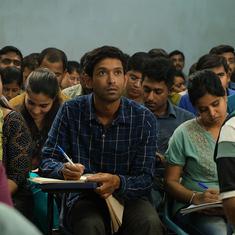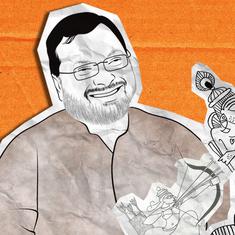Mukesh and Mahesh Bhatt’s Vishesh Films (Raaz, Murder, Hamari Adhuri Kahani) has always had a finger on the musical pulse of the nation. This is proven once again with the soundtrack of Pushpdeep Bhardwaj’s Jalebi.
The 10 songs by five composers are all about about love and longing. All of them are down-tempo ballads with memorable hooklines. Even the interludes have lovely melodies. There is not much musical experimentation, but the schmaltz is delivered with the right amount of sincerity. The lyrics are simplistic but not lazy, which is a rarity at a time when lyricists try to make their songs stand out by using English slang and colloquialisms.
The film stars Varun Mitra and Rhea Chakraborty, whose characters fall in love, get married and separate, only to cross paths years later, like in Shiboprosad Mukherjee and Nandita Roy’s 2016 film Praktan. Vishesh Films bought the rights to remake Praktan in Hindi in 2016, but the promotional material released so far does not mention the Bengali original. Jalebi will be released on October 12.
The soundtrack is aimed at ensuring that the melodies are locked in the listener’s minds right away. The easy-to-remember lyrics help achieve this.
However, Vishesh Films productions seem to follow a template for their soundtracks, and the songs have a sameness to them. The hookline or the pre-chorus is often sung or hummed at the beginning of a track, with minimal instrumentation, like a faint piano or the light strumming of an acoustic guitar. A pause follows, and then, the song begins, bringing an anthemic quality to the track. We’ve heard this before in Sunn Raha Hai Na Tu (from Aashiqui 2) and Juda Hoke Bhi (Kalyug). The trick is repeated in Jalebi’s lead singles, Pal and Tum Se.
Arijit Singh and Shreya Ghoshal, this generation’s star singers, are roped in for Pal. The two have lent their voice to many unconventional songs (like Binte Dil and Ghoomar from Padmaavat). In contrast, Pal (with music by Javed-Mohsin and lyrics by Prashant Ingole and Kunaal Verma) is an undemanding composition, but it is a first-rate earworm. There’s also a female-only version by Ghoshal, but it does not have the magic of the duet.
All that has been said about Pal also holds true for Tum Se, a song brimming with angst that has been sung by Jubin Nautiyal. The music is by Samuel-Akanksha and the lyrics are by Manoj Kumarnath. Another version of the song called Mujhme, sung by Shilpa Rao, is just as good. Her husky vocals are welcome but rare addition to a soundtrack – she last sang for a film in 2016 (Aaj Jaane Ki Zid Na Karo from Ae Dil Hai Mushkil). There are two short reprisals of the song as well, with only the chugging of a train in the background.
Singh returns in Mera Pyar Tera Pyar (music by Jeet Gannguli and lyrics by Rashmi Virag), another ballad about love which, besides a great tune, also boasts of a subtle arrangement. The songs in Vishesh Films’ productions are often criticised for their mawkishness despite becoming chartbusters, but to create such charming melodies consistently merits praise.
But the king of this soundtrack is old hand KK, whom we don’t hear as much as we would like to. KK gets three songs in the soundtrack and he knocks it out of the park in them. These aren’t as showy as some of KK’s older hits, such as Tadap Tadap from Hum Dil De Chuke Sanam (1999), but they stand out in the soundtrack.
Tera Mera Rishta, sung by KK and Ghoshal, is a breezy track that offers a welcome break from the series of emotionally laden songs. The lyrics are by Arafat Mehmood and music by Tanishk Bagchi, who can make good songs when he is not tampering with classics. KK’s robust voice plays off Ghoshal’s well. There is also a solo version by KK, which might transport the singer’s admirers to his Tu Aashiqui Hai days.
The album’s best song, buried deep in the tracklist, is Pehle Ke Jaisa composed by Abhishek Mishra and with lyrics by Rashmi Virag. The pathos-filled song begins with the rubab. A ghostly synth enters. The arrangement is minimalist. KK’s precise enunciation of Virag’s uncomplicated but effective lyrics (“Baadal toh hai par barish nahi hai; Raahein toh hain, humsafar hi nahi hai”) makes the song work well and helps it transcend the soundtrack. A sarangi appears at the right moment, elevating the song.
The soundtrack of Jalebi doesn’t have the ambition of Manmarziyaan’s album, another one of the year’s strong soundtracks. Neither does it have the lyrical strength and rich flourishes of Laila Majnu’s music. Yet, it ranks among one of the best soundtracks of the year thus far. Credit goes to the makers for sifting through good, bad and ugly compositions and choosing talented newcomers like Mishra, Samuel-Akanksha and Javed-Mohsin. The album has its guaranteed hits, but they don’t come at the cost of disregarding musical or lyrical taste, and also has simple songs with durability, which is a quality lacking in many contemporary soundtracks.










